|
Poseidon, the God of the Sea
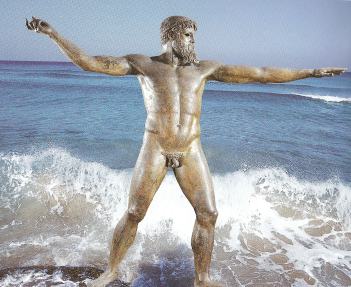
Poseidon, god of water and the sea, was an important deity for the sea-faring Greeks. He lived at the bottom of the ocean and used his trident – a gift from the Cyclopes – to rule the waves.
He was also the god of earthquakes and could rock the earth, which he also kept floating on the sea; he used his trident to create straits, ports, islands and springs.
A son of Cronus and Rhea, the god was considered by some ancient writers to be older than Zeus, thus he was always bitter at his brother for snatching power from him.
By other accounts, however, Poseidon was younger than Zeus and was spared from his father bulimia because his mother hid him among a flock of sheep.
Click on the following links to go directly to the relevant chapter:
Relationship with brother Zeus
Relationship with sister Hera
Losing a contest to Athena
Married to a Nereid
Extramarital affairs
Numerous children
The God's Cult
Poseidon crushes Polybotes in the battle against the Giants 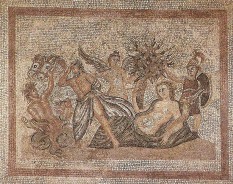 | Poseidon, despite his initial reaction to his brother’s assumption of power on Olympus, he finally succumbed to his rule. He allied himself with Zeus in the battles against the Giants and repeatedly helped Zeus’s lovers. For example, he calmed the sea so Zeus, disguised as a bull, could cross it with Europa. He also gave refuge to Leto, raising the island of Delos from the sea, and assisted Io, who was pursued by Hera across the sea.
[top]
Statue of Poseidon of Milos 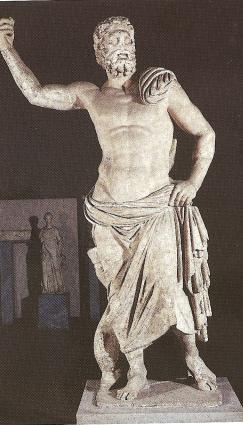 | The god of the sea and Hera collaborated to overthrow Zeus, then found themselves opposing each other over rule of Argos. Their dispute was ratified in court, which ratified Hera’s jurisdiction over the city. Angry, the mighty god punished the Argives by drying their rivers, then sending a huge tidal wave to flood the land. To appease the god, the Argives built a temple in honor of Poseidon Proclysteios (meaning "the bringer of the flood").
[top]
Poseidon’s application to become the patron of Athens was as unsuccessful as his bid for Argos.
The Athenians chose Athena, who had given them the gift of the olive tree. The god of the sea reacted by flooding the whole area around Athens.
According to other accounts, Poseidon competed against other gods as well for the patronage of other Greek cities, but always lost.
[top]
A nereid and a sea monster 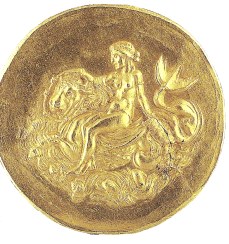 | Poseidon’s legal bride was Amphitrite. According to Hesiod, she was a sea goddess – a Nereid- one of the seven daughters of Nereus and Doris. Alteratively, according to Apollodorus, she was one of the Oceanids, born to Oceanus and Tethys. Still, according to a third account, she was a daughter of the Titan Atlas. Poseidon first caught sight of his bride to be on the island of Naxos. After falling in love with her, he kidnapped her. At first, she was reluctant to succumb to the god’s love and sought the assistance of Oceanus or Atlas, to help her hide. However, she was betrayed by Delphinus, whom the god rewarded by turning him into a constellation. From their union, the divine couple had three children: Tritron, Rhode and Benthesicyme. Amphitite became queen of the sea and protrectress of sea animals. She was named Poseidonia and she was worshipped on the islands of Tenos, Syros, and Lesbos.
[top]
Following the example set by his mighty brother Zeus, the sea god had a range of extramarital affairs as well. Some of these are the following:
- As his brother Zeus, he fell in love with his sister Demeter. To escape his courtship, she changed herself into a mare and hid herself among the horses of Ogygus. Poseidon, however, changed himself into a stallion and took her by force. From their union, they had a daughter whose name was a secret revealed only at mysteries and the divine horse Areion which had a human voice.
- Disguised as a horse, the god lay with Medusa who once was a beautiful Centaur. As the myth goes, because of the fact that their union took place in the Temple of Athena, the goddess became enraged with this sacrilegious act and punished Medusa by turning her into a beast. From her union with the god of the sea, Medusa bore two famous horses, Chrysaeor and Pegasus, who sprang from her body when Perseus beheaded her.
- From the god's union with Gaia, the giant Antaeus was born. He is mentioned to be the king of city of Isara in Libya. According to the legend, he was a formidable wrestler who fought with every stranger who visited his land. He was said to draw his strength from his contact with earth. He was finally defeated by Hercules, who strangled him after lifting him up in the air, thus preventing him to gather strength from the earth.
- Amynone, a daughter of Danaus and Europa, was another one of the god's lovers. Their affair began when the god rescued Amynone from a satyr who was trying to rape her. After their intimate contact, Poseidon struck the ground with his trident and made water flow from the spring of Amynone, later named the spring of Lerna. From their union, they had a son named Nauplius, who later founded the city of Nauplion in Greece.
- The god also had an affair with Aethra, a daughter of Pittheus the king of Troezen and bride of Aegeus. The child born from their union was Theseus, the renowned hero of Athens.
[top]
As is the case with all Olympian gods, Greek mythology is abundant with mythical figures who were claimed to be sons or daughters of the mighty ruler of the seas. These included founders of cities, kings, as well as monsters and beasts who ravaged ancient Greece.
Some of the numerous offspring of the god are the following:
- Founders of cities: Owing to the ancient Greek’s desire to claim divine ancestry, Poseidon was alleged to be the father of many children, who later became founders of cities or tribes. Some of these were Eurypulus, the king of Cyrene whom Poseidon fathered with Atlas’s daughter Celaeno; Byzantus, the founder of Byzantium who was born from the god’s union with Ceroessa and Dyrraheios, the eponym of Dyrahheion in Elyria.
- One of the cruelest king in Egypt, Busiris, was said to have divine origin from the god of the sea. He used to sacrifice all strangers who came to Egypt to Zeus, until he was finally killed by Hercules.
Another notorious king son of the god, who forced strangers to wrestle with him to their death, was Cercyon, king of Eleusis. He then suffered the same fate, that is killed through wrestling, at the hands of Theseus.
- In his mythical voyage from Troezen to Athens, Theseus managed to kill three of the legendary monsters who ravaged the area around Athens, who were said to have Poseidon as their father. These were Sceiron, Sinis (aka Pinebender) and Procrustes (Stretcher). Click here to learn more details about their encounter with Theseus.
- Another son of the god (and allegedly Aphrodite), who was in the habit of challenging strangers to wrestling matches, was Eryx, a legendary hero from Sicily, Italy. He was also killed by Hercules, in his mythical journey to Sicily, with the cattle of Geryon.
- Poseidon was also the father of Cyclops Polyphemus, who was made famous on account of his encounter with Odysseus, in his mythical voyage back to Ithaca, after the end of the Trojan War.
- Another interesting story with one of the god's offspring, was the story of Orion, the famous hunter who, after his death, became a constellation in the sky.
There are many accounts about the life and whereabouts of Orion. According to the most prominent version, the goddess Artemis was smitten by the youth’s beauty, a fact which upset her brother Apollo who tricked her into killing Orion. To console herself, Artemis immortalized her lover by turning him into a constellation, placing him in the heavens next to the hound Sirius.
Mythology also links Orion to the Greek island Chios. Orion visited this island to rid it of wild animals, then fell in love with Merope, daughter of the island’s king Oenopion (the son of Dionysus and Ariadne). To avenge his daughter, the king blinded Orion, who then regained his sight by carrying one of Hephaestus’s workers on his shoulders as a guide to the east, where Helius could be found.
[top]
Trident drawing on ancient greek coin 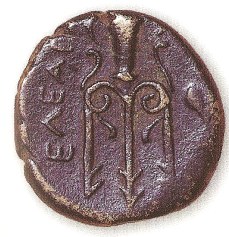 | Being the god of the sea, Poseidon was worshipped in all coastal cities and islands in ancient Greece. Sanctuaries dedicated to the god were usually found on capes, or near springs, rivers, lakes or caves.One of the most famous god's temples is the one located at Cape Sounion. Numerous cities also bear his name. One of these was Troezen, which was originally named Posidonia. In addition, cities by the name of Posidonia existed in Lower Italy and on the island of Syros. Rituals and celebrations in the god’s honor usually included sacrifices of horses and bulls, who were later thrown into the sea. Fish, pigs and wild boar were also sacrificed in the god’s honor. The cult of the sea god was most prominent in Peloponnese, and this is evidenced by the numerous remnants of temples dedicated to him. By far, the most important of these was the temple at the Isthmus of Corinthus, where panhellenic athletic competitions known as the Isthmia were held every three years at the end of April, between the second and the third years of each Olympiad. According to legend, the founder of these games was Theseus, after he rid the land around Athens of the god’s three bandit sons. On the greek islands, themples dedicated to the god of the sea are found in Euboea, Skyros in the northern Sporades and Tinos and Syros in the Cyclades. He was also worshipped in Greek colonies, especially at Syvari and Taranta in Sicily.
Return from Poseidon to Greek Pantheon
Return from Poseidon to igreekmythology.com home
|
|











